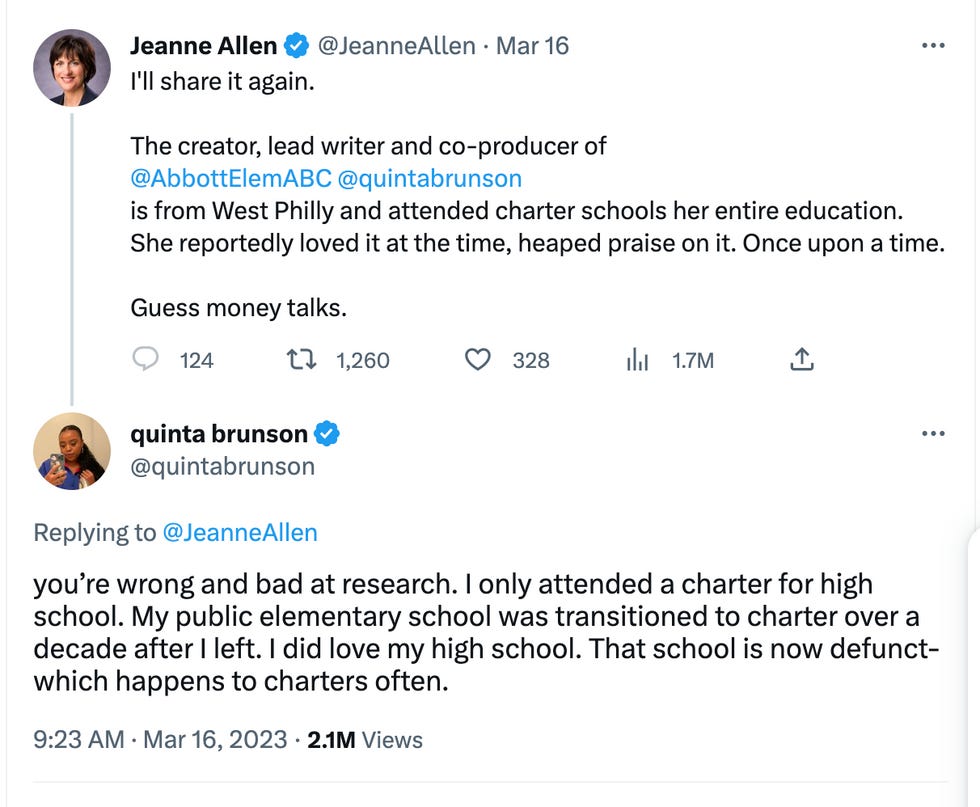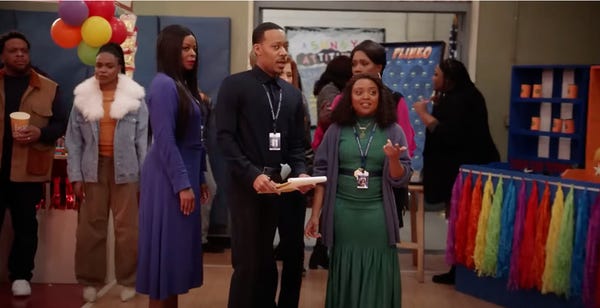Charter Schools No Joke, Unless They’re The Villain On ABC’s 'Abbott Elementary'
The hit sitcom's second season sticks up for public education.
Last week, charter school cheerleader Jeanne Allen tried to catch ABC's "Abbott Elementary" creator Quinta Brunson in a “gotcha." The most recent episode featured the Abbott teachers fighting an attempt to turn their school into a charter, and in snarky response, Allen tweeted. "I'll share it again. The creator, lead writer and co-producer of @AbbottElemABC @quintabrunson is from West Philly and attended charter schools her entire education. She reportedly loved it at the time, heaped praise on it. Once upon a time. Guess money talks."
Oh, yes, all that money in thebanana standpublic school PR business. This is classic conservative projection, as the charter school lobby has spent crap tons of money to influence elections and ballot measures across the country in recent years.

Twitter
Brunson clapped back with style: "You’re wrong and bad at research. I only attended a charter for high school. My public elementary school was transitioned to charter over a decade after I left. I did love my high school. That school is now defunct — which happens to charters often. Loving something doesn’t mean it can’t be critiqued. Thanks for watching the show : )"
"Abbott Elementary" is impressive for a number of reasons. It's a black woman-led series with actual Black writers. It's smart, quirky, and buzz-worthy while operating within the confines of commercial, broadcast TV. A hot streaming series might release 10 episodes every couple years, but "Abbott Elementary" has produced 32 episodes in a little over a year and won multiple awards, including a well-deserved Emmy for Sheryl Lee Ralph, who plays veteran kindergarten teacher Barbara Howard.
"Abbott Elementary" unquestionably supports schoolteachers and public education. Brunson, whose mother was an elementary school teacher, was adamant that the series wouldn’t treat the teachers at an underfunded Philadelphia school as the punchline. They aren’t bitter, cynical, or comically incompetent. They are all good at what they do, and while Brunson’s Janine Teagues is often naively optimistic, the show treats her faith in the school and its community as an overall positive. Even the unconventional Principal Ava Coleman is more than just a two-dimensional Frank Burns antagonist. She’s shown surprising depth underneath her shallow exterior.
The series has taken a firm stance against charter schools, which is a sharp contrast from the 2004 "West Wing" episode where Black characters preached the virtues of a pilot school vouchers program. Those Washington DC public schools are so violent and "good" kids need an opportunity to thrive. There’s no real consideration about the students (and teachers) left behind at the “failing” schools.
Legacy Charter is the looming villain in this season's "Abbott Elementary." Its superficially benign front man is Draemond Winding (Leslie Odom Jr), a former student at Abbott. Although he fondly recalls his time with Barbara, he has no love for Abbott as an institution. He would raze it to the ground and rebuild it as a charter, ostensibly in Barbara’s honor, but she has no interest in such tribute.
Charters exacerbate inequality under the pretense of meritocracy. It is objectively easier for charters to deliver “results” when they can reject the entire premise of public education. Although charters are technically required to serve all students, most have an application and selection process that just skates the line of outright discrimination. They aren't committed to providing a quality, accessible education to struggling students or those with special needs. The rate of racial segregation in charters compared to public schools is also "extraordinarily high."
While application difficulties are the norm in restricting certain applicants, some schools have resorted to much more creative strategies , including not providing subsidized lunches to discourage low-income applicants, mandate parents of students do unpaid volunteer work for the school, and, in one extreme example, invest in the company that built the school.
But even in the rare case that these policies fail to discourage lower-tier applicants, charter schools show little hesitation to handpick the students they deem easiest, aka cheapest, to educate. This means that "charter schools handpick students with higher test scores and academic records." And if the school picks the wrong candidate, they resort to "counseling out" or expelling low-performing students to inflate the school's test averages.
Brunson is right that charter schools often go defunct. Studies have shown that they have a high closure rate, and the US Department of Education reports that $176 million has gone to charter schools that later went belly up. That money could’ve been used for a least a few school supplies.
And regarding the so-called "lottery system" charter schools use for applicants, Janine's ex Tariq put it best: "I play the lottery every single day, and I never win. This man is playing the Powerball with our kids!" Tariq should run for Congress.
Follow Stephen Robinson on Twitter if it still exists.
Did you know SER has his own YouTube Channel? Well, now you do, so go subscribe right now!
Subscribe to the Wonkette YouTube Channel for nifty video content!
Click the widget to keep your Wonkette ad-free and feisty.



Nowhere like the majority of electric and gas companies in New York state (outside of the NYC area) which are owned by a company in SPAIN!
Yeah, a lot of the old fucking hippie types have been just like MAGAts in their rejection of modern health measures here, relying on crystals and herbal remidies and anything non-scentific.